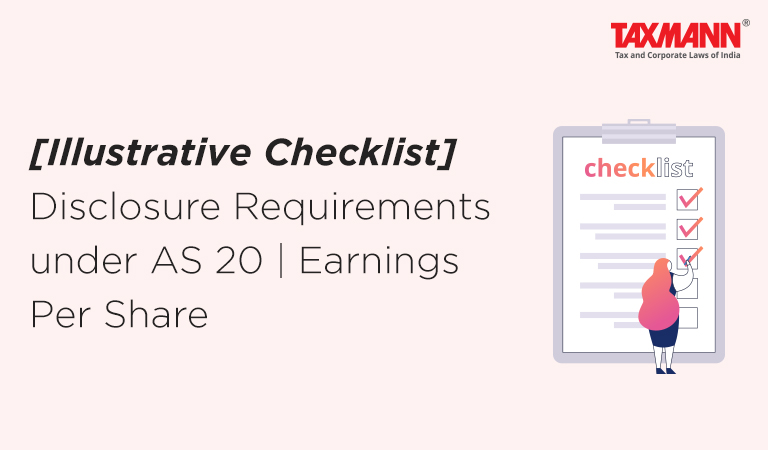[Illustrative Checklist] Disclosure Requirements under AS 20 | Earnings Per Share
- News|Blog|Account & Audit|
- 2 Min Read
- By Taxmann
- |
- Last Updated on 17 March, 2023

The objective of AS 20, Earning per share, is to prescribe principles for the determination and presentation of earnings per share which will improve the comparison of performance among different enterprises for the same period and among different accounting periods for the same enterprise. This Standard focuses on the denominator of the earnings per share calculation. Even though earnings per share data has limitations because of different accounting policies used for determining ‘earnings’, a consistently determined denominator enhances the quality of financial reporting. This Standard requires the presentation of earnings per share information on the basis of consolidated financial statements as well as individual financial statements of the parent. In consolidated financial statements, such information is presented on the basis of consolidated information.
As per the stipulation of this standard, an entity must comply with the below-mentioned disclosure requirements:
I. For each class of equity shares, on the face of the statement of profit and loss that has a different right to share in the net profit for the period, whether the following has been presented:
a. Basic earnings per share before extraordinary items
b. Basic earnings per share after extraordinary items
c. Diluted earnings per share before extraordinary items
d. Diluted earnings per share after extraordinary items
II. Has the enterprise presented the basic and diluted earnings per share with equal prominence for all periods
III. Whether the enterprise has presented the basic and diluted earnings per share, even if the amounts disclosed are negative (a loss per share)
IV. When per-share calculations reflect changes in the number of equity or potential equity shares outstanding due to bonus issue, share split or reverse share split (consolidation of shares), whether before the balance sheet date or after that date but before approval by the board of directors, whether that fact has been disclosed
Click Here To Read The Full Story
Disclaimer: The content/information published on the website is only for general information of the user and shall not be construed as legal advice. While the Taxmann has exercised reasonable efforts to ensure the veracity of information/content published, Taxmann shall be under no liability in any manner whatsoever for incorrect information, if any.

Taxmann Publications has a dedicated in-house Research & Editorial Team. This team consists of a team of Chartered Accountants, Company Secretaries, and Lawyers. This team works under the guidance and supervision of editor-in-chief Mr Rakesh Bhargava.
The Research and Editorial Team is responsible for developing reliable and accurate content for the readers. The team follows the six-sigma approach to achieve the benchmark of zero error in its publications and research platforms. The team ensures that the following publication guidelines are thoroughly followed while developing the content:
- The statutory material is obtained only from the authorized and reliable sources
- All the latest developments in the judicial and legislative fields are covered
- Prepare the analytical write-ups on current, controversial, and important issues to help the readers to understand the concept and its implications
- Every content published by Taxmann is complete, accurate and lucid
- All evidence-based statements are supported with proper reference to Section, Circular No., Notification No. or citations
- The golden rules of grammar, style and consistency are thoroughly followed
- Font and size that’s easy to read and remain consistent across all imprint and digital publications are applied



 CA | CS | CMA
CA | CS | CMA
